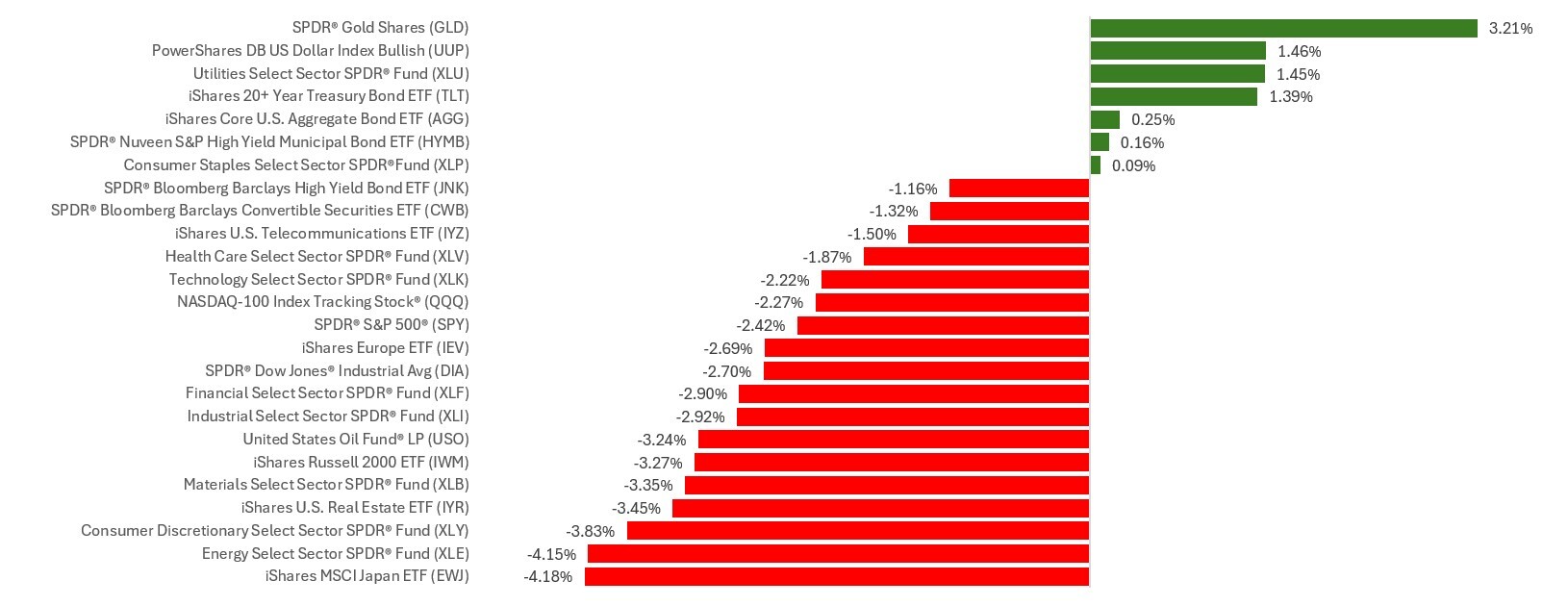
The Weekly Update
Week of October 13th, 2025
By Christopher T. Much, CFP®, AIF®

Stocks fell last week amid concerns about trade with China, following an unsteady rally to record highs over the first half of the week.
The Standard & Poor’s 500 Index fell 2.43 percent, while the Nasdaq Composite Index declined 2.53 percent. The Dow Jones Industrial Average slid 2.73 percent. The MSCI EAFE Index, which tracks developed overseas stock markets, slipped 1.64 percent.
Stocks Set Highs Before Friday’s Drop
Stocks began the week mostly positive. However, Monday marked Day 6 of the government shutdown, and two of the three major averages powered through any bearish sentiment. The S&P 500 and the Nasdaq each advanced to record closes on fresh enthusiasm for mergers & acquisitions activity after the announcement of two deals. By contrast, the Dow fell slightly.
Stocks pushed higher midweek as investors looked past the Fed meeting minutes from September, which revealed somewhat divided opinions on interest rates. The S&P and Nasdaq both closed at record highs.
On Friday, sentiment turned negative a little over an hour into the trading session after the White House announced a tariff increase on imported goods from China. The decline, led by chip manufacturers, erased the week’s gains. It was the largest single-day decline for stocks since April.
China In Focus
Meanwhile, focus turned to new export controls that China imposed on so-called rare earth metals—key ingredients for AI-powered microchips and vital resources for the defense industry. Investor concern centered mostly around AI chip companies, which have exposure to China both as customers and in terms of manufacturing.
The White House threatened to cancel its upcoming meeting with the Chinese president over the dispute. China controls approximately 70 percent of the global supply of rare earth metals, meaning a policy change can impact markets.
Separately, the government shutdown entered its second week. Shutdowns typically don’t heavily impact markets, but the uncertainty continues to hang over trading.
This Week: Key Economic Data
Monday: Philadelphia Fed President Anna Paulson speaks.
Tuesday: Small Business (NFIB) Optimism Index. Fed governors Michelle Bowman and Christopher Waller, and Boston Fed President Susan Collins speak.
Wednesday: Atlanta Fed President Raphael Bostic, and Fed governors Stephen Miran and Christopher Waller speak. Fed Beige Book.
Thursday: Retail Sales. Producer Price Index (PPI). Weekly Jobless Claims. Business Inventories. Home Builder Confidence Index. Richmond Fed President Tom Barkin, and Fed governors Michelle Bowman, Stephen Miran, and Christopher Waller speak.
Friday: Housing Starts. Building Permits. Import Prices. Industrial Production. Capacity Utilization.
Source: Investor’s Business Daily – Econoday economic calendar; October 10, 2025
The Econoday economic calendar lists upcoming U.S. economic data releases (including key economic indicators), Federal Reserve policy meetings, and speaking engagements of Federal Reserve officials. The content is developed from sources believed to be providing accurate information. The forecasts or forward-looking statements are based on assumptions and may not materialize. The forecasts also are subject to revision.
This Week: Companies Reporting Earnings
Tuesday: JPMorgan Chase & Co. (JPM), Johnson & Johnson (JNJ), Wells Fargo & Company (WFC), The Goldman Sachs Group, Inc. (GS), BlackRock (BLK), Citigroup Inc. (C)
Wednesday: Bank of America Corporation (BAC), Morgan Stanley (MS), Abbott Laboratories (ABT), The Progressive Corporation (PGR), Prologis, Inc. (PLD), The PNC Financial Services Group, Inc. (PNC)
Thursday: The Charles Schwab Corporation (SCHW), Intuitive Surgical, Inc. (ISRG), Interactive Brokers Group, Inc. (IBKR), Marsh & McLennan Companies, Inc. (MMC)
Friday: American Express Company (AXP)
Source: Zacks, October 10, 2025
Companies mentioned are for informational purposes only. It should not be considered a solicitation for the purchase or sale of the securities. Investing involves risks, and investment decisions should be based on your own goals, time horizon, and tolerance for risk. The return and principal value of investments will fluctuate as market conditions change. When sold, investments may be worth more or less than their original cost. Companies may reschedule when they report earnings without notice.


